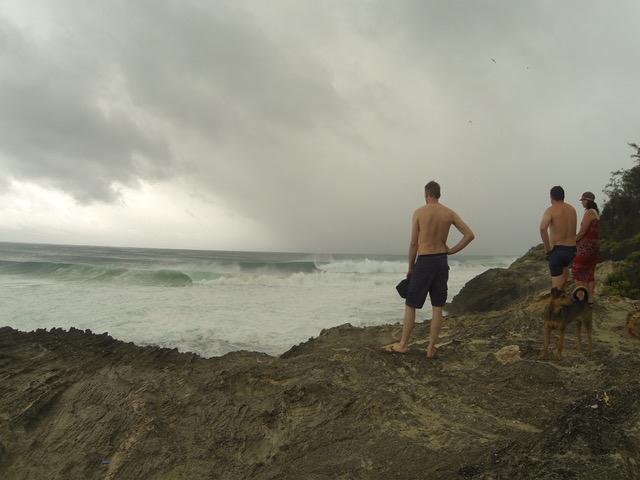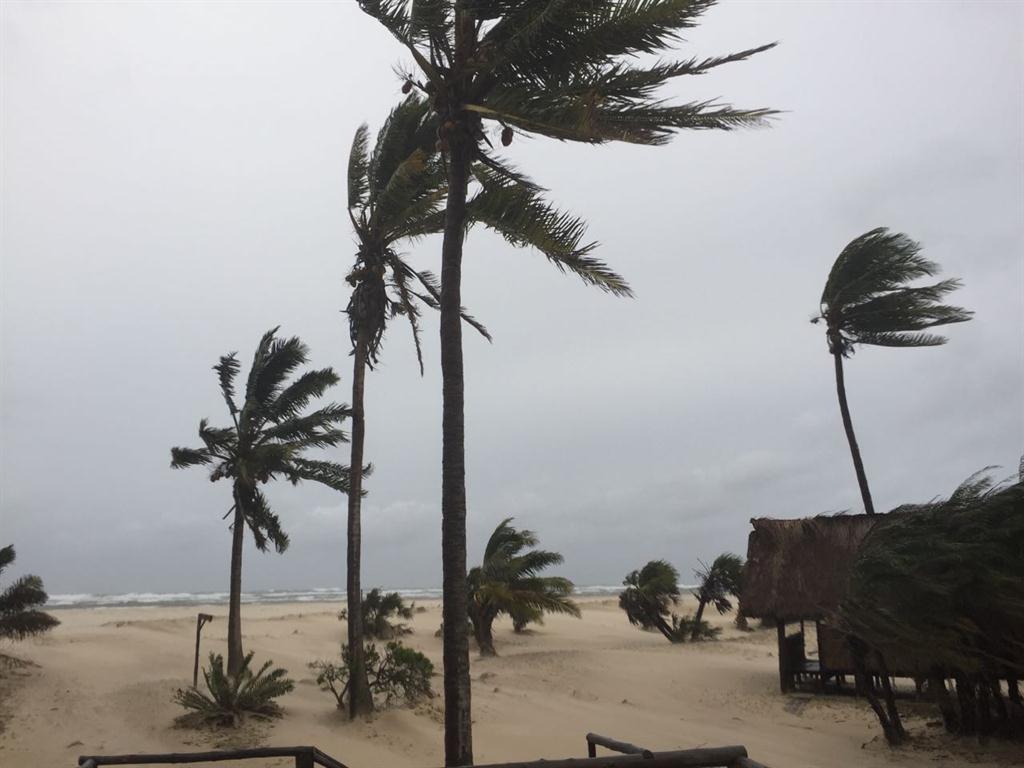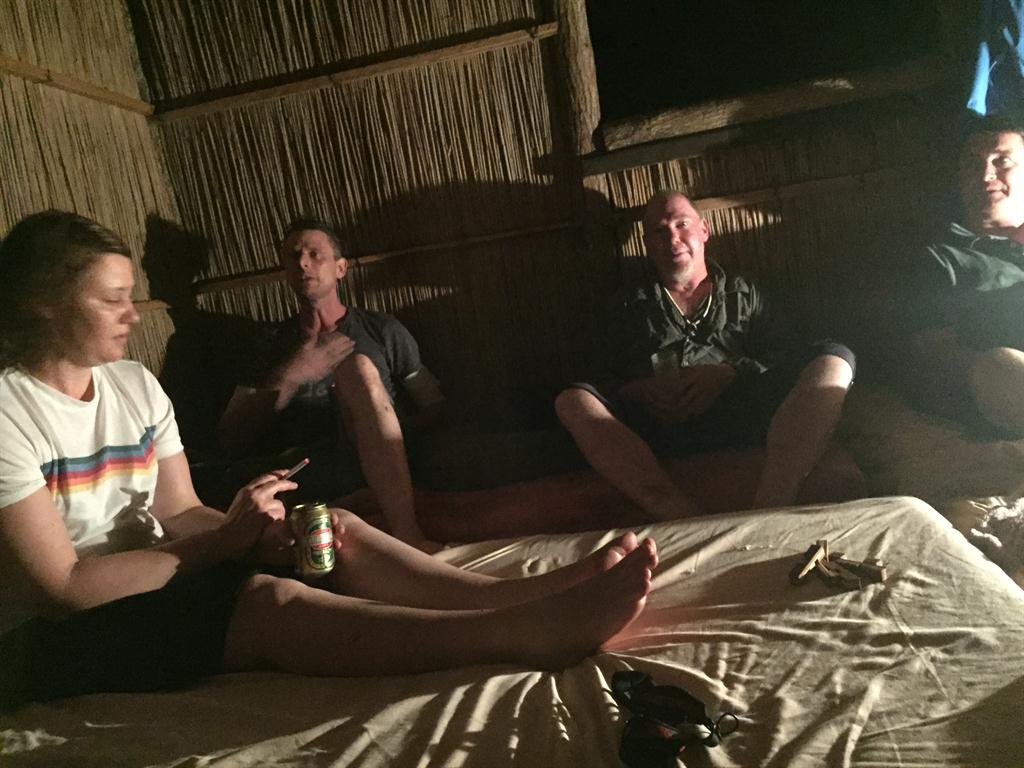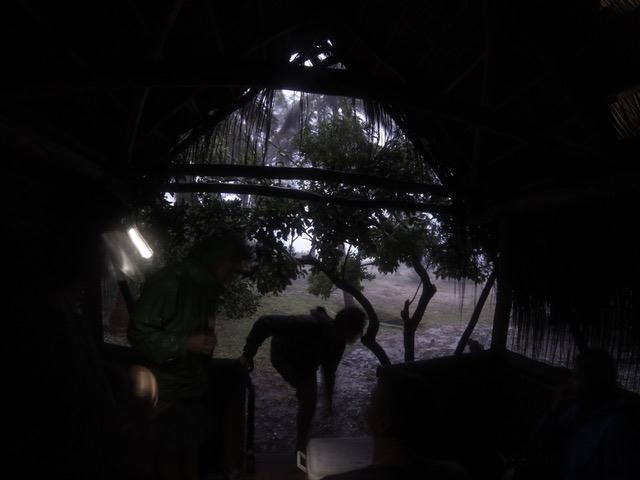Dineo storms onto bucket list
Namibian Sun journalist Jana-Mari Smith and a group of friends recently had an unexpected adventure while on holiday in Mozambique.
When you plan a sunny Mozambican holiday in February, the last thing you expect is to be caught up in a cyclone. (Well, maybe we should have read up a bit more beforehand).
Hello Dineo.
I learnt a few things that day.
The first - according to Google - a cyclone is a hurricane, is a typhoon.
Just depends on where they take place.
The second thing - when nature decides to show you who is boss - the best thing that can happen to you is to be surrounded by an incredible group of people.
We were lucky that day.
The six of us together showed Dineo a thing or two about strength and solidarity. And the jokes are fabulous when your innards are roiling with fear of the unknown.
It took us a while to realise what was happening. For it to sink in that we might be facing winds of up to 200km accompanied by biblical amounts of rain that night.
We got a peek of things to come when we visited a high rocky point overlooking the Indian Ocean early that Wednesday morning.
The usually friendly and placid light blue sea was transformed into a dark grey, angry, agitated mess of waves crashing down from heights of up to six metres.
This was only the beginning.
Realisation began to dawn.
Our family and friends - and Google - told us the eye would hit Inhambane, just a few kilometres to the south later that day.
We were in Pomene, remote and accessible only by 4x4.
We finally accepted (it now seems weird how long it took us but I suppose denial is a natural reaction) that the storm was really heading our way.
It would hit, according to various (excruciatingly slow) internet sources, at 15:00, 18:00, or 21:00, or, midnight.
Best bet was to keep a close eye on nature.
Amazing how palm trees can bend!
Sand can fly!
Waves can become monsters!
Nature told us in no uncertain terms the storm was coming closer and closer.
I will never forget the level of noise that day. It was entrenched in everything we experienced.
When we returned to camp, we opened a coconut each, and mixed a bit of rum with the water. Cheers! Strangely, there was a lot of laughter that day – tinged with fear and something else.
We made terrible and very funny jokes about our situation.
Chuck Norris was a hit.
It helped to soothe the rising tide of fear within each of us.
The increasing doubts.
We didn't talk about the fear and panic.
You don't need to.
We all felt it.
We decided not to contact our parents, in the hope that they hadn't read the news and in an attempt not to worry them.
We would call the next day, and the impending sense of doom would be a wonderful story of adventure and triumph instead.
Hopefully.
Then we got down to business.
A meeting was held, led by our team captain Bruce, whose family had built up the camp over 25 years.
On the advice of his father, we selected one of the huts next to the main hut, which was relatively well sheltered amongst a stand of trees and bushes and the main camp building. The hut is built from a sturdy mixture of wooden poles and floor board planks, with reed walls and a roof of dried grass, known as jeca. Instead of trying to outrun the storm, risking fallen trees on the rutted and sandy roads to Massinga, we would sit it out in the sturdy hut. Or hope to.
The boys got to work. They secured a large boat tarp at the front end of the hut, shielding us from the wind and rain. They lugged in about 12 mattresses. That night, when the mattresses started getting soggy from the water pooling into the hut, dripping in through the numerous openings, the second mattress was a God send.
Bunking it up
Blankets, pillows and a 'hurricane lamp' were put in place. The cars were parked in an open space, all suitcases and valuables and sheets were placed in cars and empty freezers and cupboards. Essentials were stored in little backpacks, and put in the 'bunker'.
A makeshift toilet was erected - basically a bucket on a low bench, behind a screen in the hut. Later that night, it became a game to see who could toss liquids into the madly shifting winds, without it blasting back inside.
A few things stood out for me that day. First, the fear of the water so close by. Google and numerous WhatsApp's from concerned friends and family told us we could expect 10-metre swells. In my mind, I saw the water rushing across the few metres separating the ocean from the bunker, swallowing us in the dark of the night.
Another thing was the initial confusion of what to do.
Should we stay or go?
Would we end up being a newspaper headline?
Were we overestimating or underestimating the danger?
The barrage of messages from concerned family and friends didn't help.
But it kept us on our toes.
We packed the essentials: A cooler box stuffed with beers, gin and tonics, cool drinks, water. We made burgers for lunch, and a cold chicken salad and fresh Portuguese buns would be served as bunker supper.
Chocolates were packed, cashew nuts and chips.
Another thing: Lord Basil, the dog, usually an independent character, stuck to his 'mum' Rachel like glue. He followed her everywhere.
He whined all throughout the day.
He knew something was coming.
It was eerie.
Then, in the late afternoon, the clouds darkened moodily, dusk set in much earlier than usual, the winds picked up strength and a scary level of gusting set in.
The main hut's floor started shifting in the wind, we moved into the bunker. Basil finally relaxed and promptly fell asleep under a blanket on the mattress.
Clever dog!
Fear
The carnage the day after the storm was not limited to tarps… we saw bare trees, their leaves a thick and thorny carpet on the sand, and roofs that had been tossed aside. Dozens of terns were scattered, dead, across the beach and in camp.
Some still alive, so tired they could barely walk.
Many had broken wings; mercy killing the kindest option. The birds of course were a rare treat for locals living nearby, the dual character of nature exposed: cruel and generous at the same time.
But what stood out most: The bond and strength and humour that kept the six of us going. The immense support and kindness - a hug here, a smile and a touch to the arm when, for a brief moment, you could no longer repress the fear.
The bantering and joking and compliments - superb burger and chicken salad! That tarp was placed perfectly! You pour the best gin and tonics! You guys could open a 'how to build a bunker' business!
I only realised afterwards how fear and panic can so quickly and relentlessly alternate with the feeling of being snug and safe. That's what I felt many times that night, despite the roar and whistling and bumping in the dark, stormy, night.
We played scrabble and spilled red wine as we tried to navigate through the mattress 'Christmas bed'. We huddled in wonder at the windows, marvelling at the way in which trees can bend and wind can blow in a hundred directions at once. We made a play, and handed out Oscars.
Captain Bruce took the statue this year.
Uncertainty
At one point, during the restless night, we woke and realised we were all covered in a thin film of beach sand. What we didn't know, and couldn't see in the dark, was that the stormy winds were remodelling the camp around us. Small dunes were pushed into the property, forever changing the landscape, dusting the grass and bushes like beige snow.
Of course we joked about the free body scrubs.
The next day, when the gale force winds were still blowing, but the rains had stopped, the first thing we did was search for the coffee gear in the main bunker. Amongst the toppled furniture and torn window tarps and wet floors and walls and ceiling we sat and enjoyed our steaming coffee.
We put on dry clothes – during the night a fine mist had kept us semi-wet, the hard rain filtered into a soft spray that penetrated the reed walls, grass roof and open windows.
Neighbours streamed through the doors all morning, we shared stories of what had been damaged and how little we had slept and how high the waves had been.
Urban areas had been most hard hit. Here in the rural areas, apart from the fallen palms and a few roofs blown off, everyone was relatively okay.
It was striking to me how the relatively primitive buildings, in which all of us had found shelter during the night, had withstood the gale force winds and rain. Where a roof had flown off, or a wall caved in, it was easy to reassemble as the building materials were all around us. No bricks and plaster needed to set up again.
There is something to be said for withstanding a cyclone in the bush. Eventually a group of us ended up at a local restaurant nearby. There, we drank too many beers, ate wonderful sea food and sang Bob Dylan's 'Mozambique' over and over, the surreal experience fading like the winds.
The sand still clung to our hair and the roar of the storm was replaced by the roar of happy survivors.
JANA-MARI SMITH
Hello Dineo.
I learnt a few things that day.
The first - according to Google - a cyclone is a hurricane, is a typhoon.
Just depends on where they take place.
The second thing - when nature decides to show you who is boss - the best thing that can happen to you is to be surrounded by an incredible group of people.
We were lucky that day.
The six of us together showed Dineo a thing or two about strength and solidarity. And the jokes are fabulous when your innards are roiling with fear of the unknown.
It took us a while to realise what was happening. For it to sink in that we might be facing winds of up to 200km accompanied by biblical amounts of rain that night.
We got a peek of things to come when we visited a high rocky point overlooking the Indian Ocean early that Wednesday morning.
The usually friendly and placid light blue sea was transformed into a dark grey, angry, agitated mess of waves crashing down from heights of up to six metres.
This was only the beginning.
Realisation began to dawn.
Our family and friends - and Google - told us the eye would hit Inhambane, just a few kilometres to the south later that day.
We were in Pomene, remote and accessible only by 4x4.
We finally accepted (it now seems weird how long it took us but I suppose denial is a natural reaction) that the storm was really heading our way.
It would hit, according to various (excruciatingly slow) internet sources, at 15:00, 18:00, or 21:00, or, midnight.
Best bet was to keep a close eye on nature.
Amazing how palm trees can bend!
Sand can fly!
Waves can become monsters!
Nature told us in no uncertain terms the storm was coming closer and closer.
I will never forget the level of noise that day. It was entrenched in everything we experienced.
When we returned to camp, we opened a coconut each, and mixed a bit of rum with the water. Cheers! Strangely, there was a lot of laughter that day – tinged with fear and something else.
We made terrible and very funny jokes about our situation.
Chuck Norris was a hit.
It helped to soothe the rising tide of fear within each of us.
The increasing doubts.
We didn't talk about the fear and panic.
You don't need to.
We all felt it.
We decided not to contact our parents, in the hope that they hadn't read the news and in an attempt not to worry them.
We would call the next day, and the impending sense of doom would be a wonderful story of adventure and triumph instead.
Hopefully.
Then we got down to business.
A meeting was held, led by our team captain Bruce, whose family had built up the camp over 25 years.
On the advice of his father, we selected one of the huts next to the main hut, which was relatively well sheltered amongst a stand of trees and bushes and the main camp building. The hut is built from a sturdy mixture of wooden poles and floor board planks, with reed walls and a roof of dried grass, known as jeca. Instead of trying to outrun the storm, risking fallen trees on the rutted and sandy roads to Massinga, we would sit it out in the sturdy hut. Or hope to.
The boys got to work. They secured a large boat tarp at the front end of the hut, shielding us from the wind and rain. They lugged in about 12 mattresses. That night, when the mattresses started getting soggy from the water pooling into the hut, dripping in through the numerous openings, the second mattress was a God send.
Bunking it up
Blankets, pillows and a 'hurricane lamp' were put in place. The cars were parked in an open space, all suitcases and valuables and sheets were placed in cars and empty freezers and cupboards. Essentials were stored in little backpacks, and put in the 'bunker'.
A makeshift toilet was erected - basically a bucket on a low bench, behind a screen in the hut. Later that night, it became a game to see who could toss liquids into the madly shifting winds, without it blasting back inside.
A few things stood out for me that day. First, the fear of the water so close by. Google and numerous WhatsApp's from concerned friends and family told us we could expect 10-metre swells. In my mind, I saw the water rushing across the few metres separating the ocean from the bunker, swallowing us in the dark of the night.
Another thing was the initial confusion of what to do.
Should we stay or go?
Would we end up being a newspaper headline?
Were we overestimating or underestimating the danger?
The barrage of messages from concerned family and friends didn't help.
But it kept us on our toes.
We packed the essentials: A cooler box stuffed with beers, gin and tonics, cool drinks, water. We made burgers for lunch, and a cold chicken salad and fresh Portuguese buns would be served as bunker supper.
Chocolates were packed, cashew nuts and chips.
Another thing: Lord Basil, the dog, usually an independent character, stuck to his 'mum' Rachel like glue. He followed her everywhere.
He whined all throughout the day.
He knew something was coming.
It was eerie.
Then, in the late afternoon, the clouds darkened moodily, dusk set in much earlier than usual, the winds picked up strength and a scary level of gusting set in.
The main hut's floor started shifting in the wind, we moved into the bunker. Basil finally relaxed and promptly fell asleep under a blanket on the mattress.
Clever dog!
Fear
The carnage the day after the storm was not limited to tarps… we saw bare trees, their leaves a thick and thorny carpet on the sand, and roofs that had been tossed aside. Dozens of terns were scattered, dead, across the beach and in camp.
Some still alive, so tired they could barely walk.
Many had broken wings; mercy killing the kindest option. The birds of course were a rare treat for locals living nearby, the dual character of nature exposed: cruel and generous at the same time.
But what stood out most: The bond and strength and humour that kept the six of us going. The immense support and kindness - a hug here, a smile and a touch to the arm when, for a brief moment, you could no longer repress the fear.
The bantering and joking and compliments - superb burger and chicken salad! That tarp was placed perfectly! You pour the best gin and tonics! You guys could open a 'how to build a bunker' business!
I only realised afterwards how fear and panic can so quickly and relentlessly alternate with the feeling of being snug and safe. That's what I felt many times that night, despite the roar and whistling and bumping in the dark, stormy, night.
We played scrabble and spilled red wine as we tried to navigate through the mattress 'Christmas bed'. We huddled in wonder at the windows, marvelling at the way in which trees can bend and wind can blow in a hundred directions at once. We made a play, and handed out Oscars.
Captain Bruce took the statue this year.
Uncertainty
At one point, during the restless night, we woke and realised we were all covered in a thin film of beach sand. What we didn't know, and couldn't see in the dark, was that the stormy winds were remodelling the camp around us. Small dunes were pushed into the property, forever changing the landscape, dusting the grass and bushes like beige snow.
Of course we joked about the free body scrubs.
The next day, when the gale force winds were still blowing, but the rains had stopped, the first thing we did was search for the coffee gear in the main bunker. Amongst the toppled furniture and torn window tarps and wet floors and walls and ceiling we sat and enjoyed our steaming coffee.
We put on dry clothes – during the night a fine mist had kept us semi-wet, the hard rain filtered into a soft spray that penetrated the reed walls, grass roof and open windows.
Neighbours streamed through the doors all morning, we shared stories of what had been damaged and how little we had slept and how high the waves had been.
Urban areas had been most hard hit. Here in the rural areas, apart from the fallen palms and a few roofs blown off, everyone was relatively okay.
It was striking to me how the relatively primitive buildings, in which all of us had found shelter during the night, had withstood the gale force winds and rain. Where a roof had flown off, or a wall caved in, it was easy to reassemble as the building materials were all around us. No bricks and plaster needed to set up again.
There is something to be said for withstanding a cyclone in the bush. Eventually a group of us ended up at a local restaurant nearby. There, we drank too many beers, ate wonderful sea food and sang Bob Dylan's 'Mozambique' over and over, the surreal experience fading like the winds.
The sand still clung to our hair and the roar of the storm was replaced by the roar of happy survivors.
JANA-MARI SMITH









Comments
Namibian Sun
No comments have been left on this article